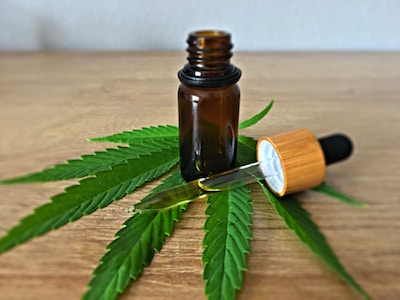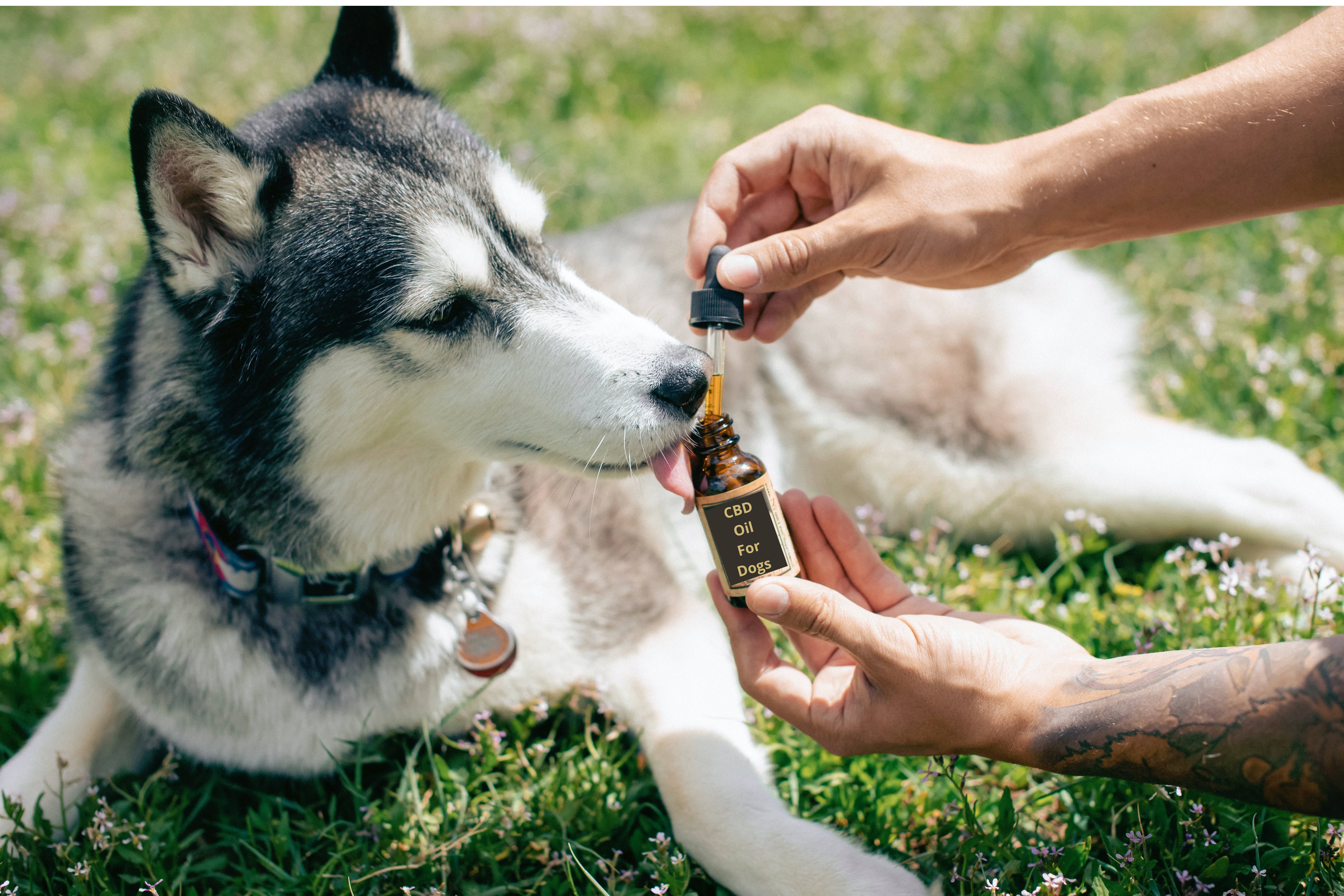Chances are you’ve heard of Cannabidiol, also known as CBD. You may have even seen CBD oil in grocery stores, pharmacies, and boutique stores. But did you know that CBD oil provides a number of benefits to our canine friends?
If you’re a pet owner, then you know what it feels like to want the best for your four legged friends. You may also know that some prescription medications offer an array of unwanted side effects. While CBD is in no way a miracle supplement, it could offer your dog some therapeutic benefits. Let’s look at how CBD affects our canine friends and see if CBD oil can be a good fit for them as well.
But first, a quick reminder of where CBD comes from and what it is.
What is CBD?
CBD is a natural compound that organically occurs in the cannabis and hemp plant. People often confuse CBD with THC, also known as tetrahydrocannabinol, the infamous psychoactive ingredient found in both cannabis and hemp. However, despite its origin, CBD is completely non-psychoactive.
Since the 2018 Farm Bill was passed, it has been legal to cultivate and sell products derived from hemp. This is because only trace amounts of THC are found in the hemp plant. Because of this, most CBD products found throughout America are derived from hemp (this includes pet CBD products as well).
But is CBD even safe for dogs to consume? And what are the benefits of CBD for dogs?
How does CBD work for dogs?
Humans and dogs have a lot more in common than you might think. Like humans, dogs are mammals, and according to scientists, all mammalian species have an Endocannabinoid System (ECS) –– a complex communication system responsible for signaling balance and homeostasis throughout the body. This system plays an integral role in relieving pain and inflammation, as well as maintaining metabolism, digestion, embryological development, as well as neurological and reproductive function. In other words, the ECS is what keeps both humans’ and dogs’ bodies functioning properly.
So where does CBD come in and how does it work for our canine friends?
To fully understand how CBD works in our canine friends’ bodies, we need to look at how CBD works with the ECS. But first, let’s look at the three vital parts of the ECS.
The ECS is made up of three parts:
- Endogenous cannabinoids –– these molecules are messengers that help stimulate and activate receptor cells throughout the body.
- Endogenous receptor cells –– these receptor cells are broken down in two categories and are found all throughout the body. The first set is CB1 receptor cells, which are predominantly found in the central nervous system. The second is CB2 receptor cells, and these are primarily found in the peripheral nervous system, otherwise known as the immune system. Both receptor cells help signal and communicate balance throughout the body.
- Endogenous enzymes –– these molecules break down the cannabinoids found within the body as well as the phytocannabinoids found in plants like hemp.
Amazingly, scientists have found that dogs have a larger amount of cannabinoid receptor cells than humans throughout various parts of their brain and body. Unfortunately, there is no conclusive data on how CBD works in a dog's body. But according to studies done on humans, researchers have found that when CBD is consumed, it helps the body naturally create and preserve endogenous cannabinoids. Theoretically, this is what’s happening when our canine friends partake of CBD oil as well. In fact, anecdotal data from many dog owners shows that CBD helps with a number of health-related issues that our canine friends suffer from.
This leads us to our next topic: The benefits of CBD for dogs.
The benefits of CBD oil for dogs
According to Dr. Jerry Klein, the chief veterinary officer at the American Kennel Club, CBD contains “anti-inflammatory properties, cardiac benefits, anti-nausea effects, appetite stimulation, anti-anxiety impact, and possible anti-cancer benefits.” However, the data surrounding anti-cancer benefits has yet to be determined.
That said, let’s look at the scientific data surrounding the benefits of CBD for dogs.
CBD oil for dogs with arthritis
Like humans, our canine friends can suffer from a number of inflammatory health issues, like arthritis. More often than not, veterinarians will prescribe medications that help treat the symptoms associated with arthritis. And while these prescription drugs may help for a short while, they rarely address the root cause: Inflammation.
Amazingly, studies have shown that CBD contains pretty potent anti-inflammatory properties. However, more specific studies involving dogs have found that CBD increased the activity and mobility in dogs suffering from osteoarthritis. Researchers also found no adverse effects when using CBD in this study.
CBD oil for dogs with epilepsy and seizures
If your dog suffers from epilepsy and seizures, you know too well the fear and the powerlessness you have when a seizure episode occurs. But according to a groundbreaking study, researchers found that over “90% of the dogs receiving CBD had a reduction in seizure activity.”
CBD oil for pain in dogs
We all experience pain, and unfortunately, so do our canine friends. One thing most dog owners and even people don’t know is that where there is pain, there is inflammation. Pain is often a symptom of hidden inflammation. That’s because when something is off in our body, inflammation sets in to try to heal the problem. But when the canine body can’t heal it quickly enough, chronic inflammation sets in and pain takes over.
In the same study involving osteoarthritic dogs, researchers found a significant reduction of pain, leading to an increase in activity. Anecdotal evidence from pet owners even shows that dogs who suffer from bone breaks, post operations, and other pain-related issues experience less pain when given CBD.
CBD oil for dogs with anxiety
Anxiety is perhaps the most common health-related issue in dogs. It can be brought on by a number of reasons:
- Loud noises
- New places
- A new addition to the family
- A change in their routine
- Excessive traveling
- Etc.
One thing is for sure: an anxious dog means unwanted stress for both you and your canine friend. But according to a study involving mice, CBD not only reduced the anxiety in mice but lowered their stress and improved their mood as well. This study alone shows promise for our canine friends. In fact, anecdotal evidence again shows that many pet owners resort to CBD oil for dogs during firework season, traveling, and moving.
While these benefits are groundbreaking and encouraging, the question most pet owners ask next is: Is CBD oil safe for our canine friends?
Is CBD oil safe for dogs?
While the risks of dogs consuming CBD oil is not yet fully researched, studies do show that CBD has a well documented safety profile among humans and animals. Still, it’s important to know that any substance, supplement, or medication presents some risk of reaction.
Possible side effects of CBD for dogs may include:
- A small drop in blood pressure
- A decrease of saliva production resulting in dry mouth
- A slight drowsiness effect when consumed in higher amounts
While these side effects are rare, they quickly fade, if felt at all. That said, it’s always imperative to consult with your veterinarian if you are considering CBD oil for your dog. This is especially true for dogs who are already on medication.
While CBD oil is often held under the tongue for about 60-90 seconds at a time, it’s impossible to communicate to our dogs to hold the oil under their tongue. For the most part, CBD oil is often mixed with their food, given to them in the form of a CBD dog treat, or administered directly into their mouth. In all cases, however, dogs will immediately swallow CBD, which then enters their digestive system.
If your dog is currently on any prescription medications, consuming any form of CBD may raise some issues with your vet. This is due to the fact that when CBD enters the digestive tract, it must also be filtered through the liver. During this filtration process, a family of enzymes (Cytochrome P450 - CYP450) has to break it down. These enzymes are the same enzymes that help break down other medications. The issue here is that when CBD is combined with other medications, it can either enhance or decrease their effects. It can also prolong the amount of time these medications remain in our canine’s body.
For example, even if you’re following the recommended dose your vet gives your dog for a certain medication, say three times a day, and then you give them CBD once or even twice a day, it could actually slow the metabolism and filtration process of the medication significantly. This may increase how much medication is in your dog's system, which then may increase the side effects of that prescribed medication.
However, if your dog is not currently on any medications, consuming CBD may not be an issue. Still, seek out recommendations from your vet before adding CBD to their routine.
CBD oil for dogs dosage
As always, it’s best to consult with your veterinarian before adding CBD to your dog’s regimen. They may recommend a certain CBD oil brand and dosage. However, if you don’t have a veterinarian to consult with, you may want to do some research on how much CBD you should give to your dog.
The most important advice to follow when determining how much CBD oil to give to your dog is to simply follow the dosing instructions on the label. Reputable pet CBD companies will always have dosing instructions on the label of their products. If you find there is no dosing instruction or recommendations, you may want to reconsider using that CBD brand.
Why is this important? No two CBD companies will formulate their pet CBD products the same. Some may be stronger than others. That said, dosing may vary depending on the strength and the formulation of the product. If you and your dog are new to CBD oil, it’s best to start slow and at a low dosage. This will help you observe your dog as you gradually increase the dosage level until you see the desired results.
Generally speaking, one of the best ways to determine how much CBD oil you should give to your dog is by their weight: Milligrams of CBD to kilograms of dog weight. For example, a 10 pound dog will receive a smaller amount of CBD oil than a 50 pound dog. Nevertheless, when considering CBD oil for your dog, it’s best to view it as an individualized supplement or medicine. And always seek out reputable CBD brands.
How do I find the best CBD oil for dogs?
While some big box chains like PetSmart have started to offer CBD oil for dogs, one of the easiest places to find the best CBD oil is online. Along with dosing instruction, reputable CBD companies will always provide their customers with third party testing results, a list of ingredients in each CBD product, and their cultivating practices.
Because the CBD industry is poorly regulated, reputable CBD companies have to take extra precautions, steps, and actions to prove their products are safe and accurately formulated. Without doing your research, you could unwittingly put your dog’s health in harm's way.
Here are a few questions to look for when searching CBD oil for your dog:
- Does the CBD company provide test results of their CBD products?
- Does the CBD company provide dosing instructions?
- How often are they testing their CBD products?
- Do they provide a list of ingredients for each of their CBD products?
- Do they practice good farming practices? (i.e., no pesticides, herbicides, GMO’s, or other toxins.)
- Is their customer service helpful, informative, and sincere?
Asking these questions can make all the difference when searching for the best CBD oil for your dog.
Final thoughts
It’s no doubt that more research is needed regarding CBD oil and its effects on our dogs. But it’s safe to say that CBD does contain some promising therapeutic properties that can be beneficial for you and your dog. Just remember to take things slowly and consult with your veterinarian when trying any new supplement, medicine, or herb.






